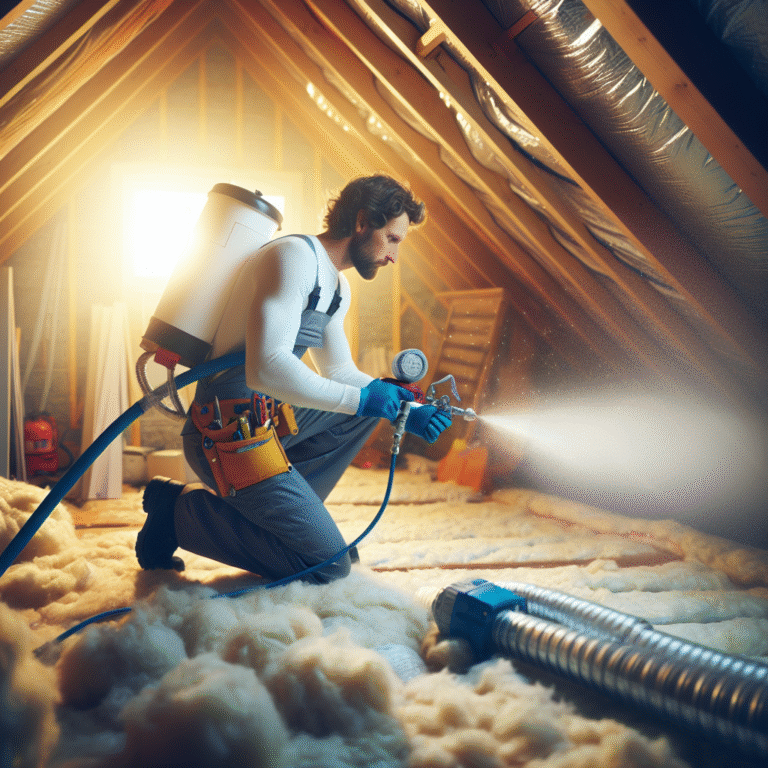Maximize Energy Efficiency with Durable Spray Foam Insulation: The Top Benefits
Introduction
Upgrading your attic with spray foam insulation is one of the smartest investments you can make for long-term energy savings and home comfort. Durable spray foam insulation creates an airtight seal, blocks heat transfer, and adapts to irregular spaces—qualities that standard fiberglass or cellulose simply can’t match. In this article, we’ll explore what makes spray foam insulation unique, highlight its top benefits, and explain how this high-performance solution can lower your energy bills while protecting your home for years to come.
H2: What Is Durable Spray Foam Insulation?
Spray foam insulation is a two-component mixture—polyol resin and isocyanate—that expands into a rigid foam when applied. There are two main types: open-cell, which is softer and more flexible, and closed-cell, which is denser and offers a higher R-value per inch. Both variations adhere to roof decks, rafters, and studs to fill every crack and crevice. Over time, this durable barrier resists settling, moisture, and pest intrusion, ensuring consistent performance in any climate.
H2: Top Benefits of Spray Foam Insulation for Your Attic
1. Exceptional Energy Efficiency
Closed-cell spray foam insulation can achieve R-values of 6 to 7 per inch—well above that of fiberglass batts. By sealing gaps around pipes, vents, and wiring, spray foam prevents air leakage that drives up heating and cooling costs. Many homeowners report up to 30% reductions in monthly utility bills once their attic is properly insulated with spray foam.
2. Lasting Durability
Unlike traditional loose-fill or batt insulation that can sag, shift, or settle over time, spray foam retains its shape and R-value for the life of your home. It adheres firmly to surfaces and resists compression, which means you won’t need costly top-ups or replacements down the road.
3. Superior Air and Moisture Barrier
Spray foam insulation acts as both an air barrier and a vapor retarder. By blocking convective air movement and moisture infiltration, it helps prevent mold, mildew, and wood rot in your attic. This dual protection can extend the lifespan of roof sheathing and structural components, safeguarding your home against expensive water damage.
4. Improved Indoor Air Quality
An airtight envelope keeps outdoor pollutants, dust, and allergens at bay. When spray foam insulation is professionally applied, it reduces drafts and eliminates cold spots, creating a more comfortable environment. Better air sealing also eases the workload on HVAC systems, leading to fewer maintenance issues and longer equipment life.
5. Sound Dampening
The dense nature of closed-cell spray foam delivers sound-dampening benefits, reducing noise transmission between floors and from outside sources. Whether you live near busy streets or simply want a quieter home theater experience, spray foam insulation can make a noticeable difference.
6. Environmental Advantages
Many spray foam products are formulated with eco-friendly blowing agents and recycled materials. By cutting energy consumption and reducing greenhouse gas emissions, spray foam insulation supports sustainable living goals. Its durability also means less frequent replacement, lowering waste over the long term.
H2: How Durable Insulation Saves You Money on Energy Bills
Investing in spray foam insulation often pays for itself within a few years. Here’s how:
• Reduced Heating and Cooling Loads: A tighter building envelope minimizes heat gain in summer and heat loss in winter.
• Lower Peak Demand: With less extreme temperature swings, your HVAC system operates more efficiently during peak hours, further cutting utility surcharges.
• Increased HVAC Lifespan: By easing strain on furnaces and air conditioners, you delay costly repairs or premature replacement.
• Potential Incentives: Many local utilities and government programs offer rebates or tax credits for high-performance insulation upgrades, offsetting initial installation costs.
H3: Frequently Asked Questions About Spray Foam Insulation
Q1: Is spray foam insulation safe for my family?
A1: When properly installed by trained professionals and fully cured, spray foam insulation poses no health risks. Modern formulations use low-VOC blowing agents and meet strict safety standards.
Q2: How long does spray foam insulation last?
A2: Closed-cell spray foam can last 20–30 years or more without significant degradation, thanks to its resistance to settling, moisture, and pest damage.
Q3: Can I install spray foam insulation myself?
A3: DIY spray foam kits are available, but professional installation ensures proper mixing, coverage, and safety precautions, delivering the best performance and warranty protection.
Conclusion
By choosing durable spray foam insulation for your attic, you’re sealing in savings and sealing out energy waste. This high-performance solution delivers outstanding R-values, airtight sealing, moisture control, and long-lasting durability—qualities that translate into lower utility bills, improved indoor comfort, and a healthier home. If you’re ready to maximize energy efficiency and protect your investment, consider spray foam insulation as the cornerstone of your next home upgrade.




